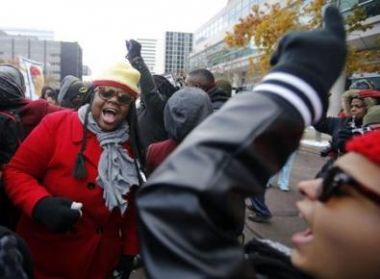DOJ will not prosecute former Ferguson police officer Darren Wilson

The controversial investigation of former Ferguson police officer Darren Wilson ended with no charges filed this week.
The Department of Justice (DOJ) declined to prosecute Wilson, who shot and killed an unarmed black teenager in August.
Michael Brown, 18, was with a friend, Dorian Johnson, when they came into contact with Wilson on August 9. According to police, Brown struggled with the officer's gun, and Wilson shot Brown several times.
Johnson told news station KMOV that Brown had his arms raised in a non-confrontational stance, but Wilson continued to fire his weapon.
After news of the shooting spread, Ferguson residents engaged in weeks of protests that were at times violent. Police engaged tear gas and bean-bag rounds to disperse the crowds, and many were arrested.
The DOJ found that Wilson's actions "do not constitute prosecutable violations under the applicable federal criminal rights statute," and that witness accounts describing Brown's hands in the air were unreliable.
"Although there are several individuals who have stated that Brown held his hands up in an unambiguous sign of surrender prior to Wilson shooting him dead, their accounts do not support a prosecution of Wilson," the report read.
The DOJ did find evidence of racial bias within Ferguson police practices, and racism in other city departments.
Outcry over the Ferguson decision and other incidents of unarmed blacks being killed by police increased racial tensions in the country over the past six months, and led to a reparative response from community and religious leaders.
Megachurch pastor T.D. Jakes led a summit called "Healing the Racial Divide" at his Potter's House church in Dallas in January, and brought together politicians, community leaders, United Nations representatives, among others.
"This is America's burden as well as her opportunity to rightfully tilt the scales toward justice for all," Bishop Jakes said. "This is also a tremendous opportunity for the church to be the light in what have been very dark days for our country."











